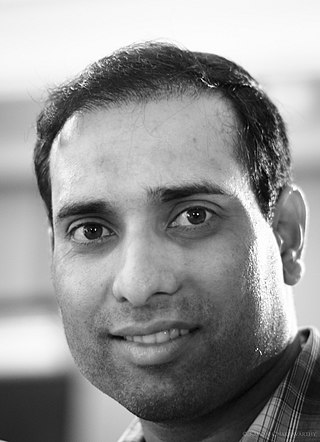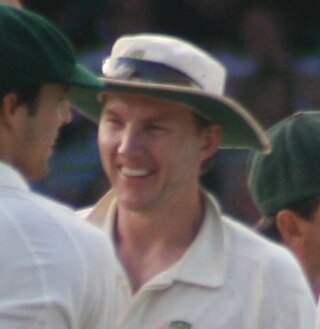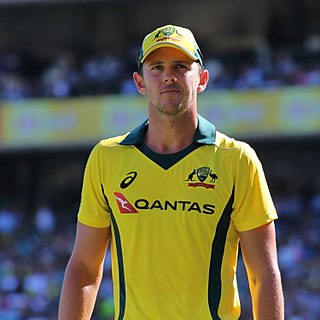
The 2003 ICC Cricket World Cup was the eighth Cricket World Cup, organised by the International Cricket Council (ICC). It was co-hosted by South Africa, Zimbabwe and Kenya from 9 February to 23 March 2003. This edition of the World Cup was the first to be played in Africa.

Anil Kumble is an Indian former cricket captain, coach and commentator who played Test and One Day International cricket for his national team over an international career of 18 years. Widely regarded as one of the best leg spin bowlers in Test Cricket History, he took 619 wickets in Test cricket and is the fourth highest wicket taker of all time as of 2022. In 1999 while playing against Pakistan, Kumble dismissed all ten batsmen in a Test match innings, joining England's Jim Laker as the second player to achieve the feat. Unlike his contemporaries, Kumble was not a big turner of the ball, but relied primarily on pace, bounce, and accuracy. He was nicknamed "Apple" and "Jumbo". Kumble was selected as the Cricketer of the Year in 1993 Indian Cricket, and one of the Wisden Cricketers of the Year three years later. Kumble was a member of the Indian team that was one of the joint-winners of the 2002 ICC Champions Trophy, which the title was also shared with Sri Lanka.
Michael Gwyl Bevan is a former Australian cricketer. He is a left-handed batsman and a slow left arm wrist-spin bowler. He has been credited for initiating the art of finishing matches. For several years, he was considered as world's finest ever ODI batsman, and topped the ICC ODI batting rankings on numerous occasions. He was the first Canberra-born player to represent Australia at international level. He was known for his ability to run between the wickets at a quick rate and for his ability to play shots down the ground with ease.

Vangipurapu Venkata Sai Laxman is a former Indian international cricketer and a former cricket commentator and pundit. A right-hand batsman known for his elegant stroke play, Laxman played as a middle-order batsman in Test cricket. Laxman is currently the Head of Cricket at the National Cricket Academy (NCA), and the head coach of the India Under-19 and India A teams. Laxman was a member of the Indian team that was one of the joint-winners of the 2002 ICC Champions Trophy, which the title was also shared with Sri Lanka.

Jason Neil Gillespie is an Australian cricket coach and former cricketer who played all three formats of the game. A right-arm fast bowler, he was also a competent lower-order batsman whose unbeaten 201 in his last Test match is the highest score by a night-watchman in international cricket.

Glenn Donald McGrath is an Australian former international cricketer whose career spanned 14 years. He was a fast-medium pace bowler and is considered one of the greatest bowlers of all time, and a leading contributor to Australia's domination of world cricket from the mid-1990s to the late 2000s. McGrath was a member of the Australian team that won three consecutive World Cup trophies in a row, winning the 1999 Cricket World Cup, the 2003 Cricket World Cup, and the 2007 Cricket World Cup. In the 2003 final, he took the winning wicket of Zaheer Khan. McGrath was also a member of the team that won the 2006 ICC Champions Trophy.

The Border–Gavaskar Trophy is an International Test cricket series played between India and Australia. The series is named after distinguished former captains, Australia's Allan Border and India's Sunil Gavaskar. It is played via the International Cricket Council's future tours.

Brett Lee is an Australian former international cricketer, who played all three formats of the game. During his international career, Lee was recognised as one of the fastest bowlers in the world. With his time representing Australia, Lee won multiple ICC titles with the team: the 2003 Cricket World Cup, the 2007 Cricket World Cup, the 2006 ICC Champions Trophy, and the 2009 ICC Champions Trophy. Lee was the first bowler to take a hat-trick in the T20 format of the game which he did in 2007 ICC World Twenty20 in the inaugural tournament against Bangladesh, subsequently being the first bowler to do so at an ICC Men's T20 World Cup. Lee was also the first Australian bowler to take a hat-trick at a Cricket World Cup which he did in the 2003 Cricket World Cup Super Match game against Kenya.
Ramnaresh Ronnie Sarwan is a former Guyanese cricketer who played as a batsman. He is a former member and former captain of the West Indies cricket team, in all formats. Sarwan went on to average over 40 in both the test and one day international forms of cricket. He is considered to be one of the best batter of his generation. Sarwan was a member of the West Indies team that won the 2004 ICC Champions Trophy, and was subsequently the player of the tournament.

Michael Edward Killeen Hussey is an Australian cricket coach, commentator and former international cricketer, who played all forms of the game. Hussey is also widely known by his nickname 'Mr Cricket'. Hussey was a relative latecomer to both the one-day international and Test Australian teams, debuting at 28 and 30 years of age in the respective formats, with 15,313 first-class runs before making his Test debut. With his time representing Australia, Hussey won multiple ICC titles with the team: the 2007 Cricket World Cup, the 2006 ICC Champions Trophy, and the 2009 ICC Champions Trophy.

Jerome Everton Taylor is a Jamaican cricketer who has played as a fast bowler for the West Indies. Taylor eventually picked up 100 wickets for the Windies in both tests and odis. During 2017 he reversed an initial decision to retire from international cricket. Taylor has also featured for Jamaica, English sides Somerset, Leicestershire and Sussex, CPL teams St Lucia Zouks and Jamaica Tallawahs and IPL sides Pune Warriors and Mumbai Indians in his cricketing career. Taylor was a member of the West Indies team that won the 2016 T20 World Cup. He is the only bowler to have ever taken a hat-trick in a Champions Trophy match, which he did in the 2006 tournament against Australia, and that was the first hat-trick taken by a West Indian bowler in the ODI format.
The West Indies cricket team toured Australia in October and November 2005 as part of the 2005–06 Australian cricket season. The West Indian cricket team will be looking to prove that they can perform against the number one rated side in the world. Australia on the other hand will be looking to build on their World XI performance and prove their Ashes critics wrong - and after winning the first two Tests by convincing margins, the Australians secured the series win to retain the Frank Worrell Trophy for the sixth time running. The West Indies were looking to avoid the series whitewash for the second consecutive time, and posted their highest total of the series in the first innings of the third Test, with Brian Lara making 226 to pass Allan Border as the all-time highest scorer in Test cricket.
India toured the West Indies during the 2006 international cricket season. India were ranked highly above the West Indies in both the ICC Test Championship as well as the ICC ODI Championship but the latter team had the favour of beating Zimbabwe 5–0 in a series of One Day International matches earlier in the month. West Indies eventually emerged as winners of this ODI series, taking it 4–1 after losing the first match in the final over.

In 2001, the Australia national cricket team toured England and Ireland to play county matches and the 2001 Ashes series. The Ashes series was played from 5 July to 27 August.
The West Indies cricket team toured England in the 2000 cricket season. West Indies played five Tests against England - two in June and three in August - with a triangular One Day International (ODI) series involving Zimbabwe in July.

Josh Reginald Hazlewood is an Australian international cricketer. He is a tall pace bowler known for his accuracy and has been compared to former Australian paceman Glenn McGrath. Hazlewood currently ranks no.1 in ODI, no.7 in T20I and no.15 in Test in the ICC Men's Player Rankings. He was a part of the Australian side that won both 2015 and 2023 Cricket World Cup, 2021 ICC Men's T20 World Cup and 2021–2023 ICC World Test Championship.

Shane Keith Warne was an Australian international cricketer whose career ran from 1992 to 2007. Warne played as a right-arm leg spin bowler and a right-handed batsman for Victoria, Hampshire and Australia. Considered to be one of the greatest players in the history of the sport, he made 145 Test appearances, taking 708 wickets, and set the record for the most wickets taken by any bowler in Test cricket, a record he held until 2007. Warne was a member of the Australian team that won the 1999 Cricket World Cup.

The Australian cricket team toured the Caribbean from February to April 1999 to play four Tests and seven One Day Internationals (ODIs) against the West Indies. Australia additionally played three first-class matches, winning two and drawing one. The Test series was drawn 2–2 resulting in the Frank Worrell Trophy remaining in Australia. The ODI series was also drawn with three wins each and one tie. This was the first four-match series in the history of Test cricket to finish as a two-all draw. The only other four-match Test series, as of January 2022, to finish with the same result was England at home to Pakistan in 2016.
Kuldeep Yadav is an Indian international cricketer. He is a bowling allrounder who bowls Left-arm unorthodox spin and is a capable lower order batter who plays for India and for Uttar Pradesh in domestic cricket. He was signed by the Delhi Capitals for the Indian Premier League.
The England national cricket team toured the West Indies from February to April 1986 and played a five-match Test series against the West Indies cricket team which the West Indies won 5–0. England were captained by David Gower; the West Indies by Viv Richards. In addition, the teams played a four-match One Day International (ODI) series which the West Indies won 3–1.

















